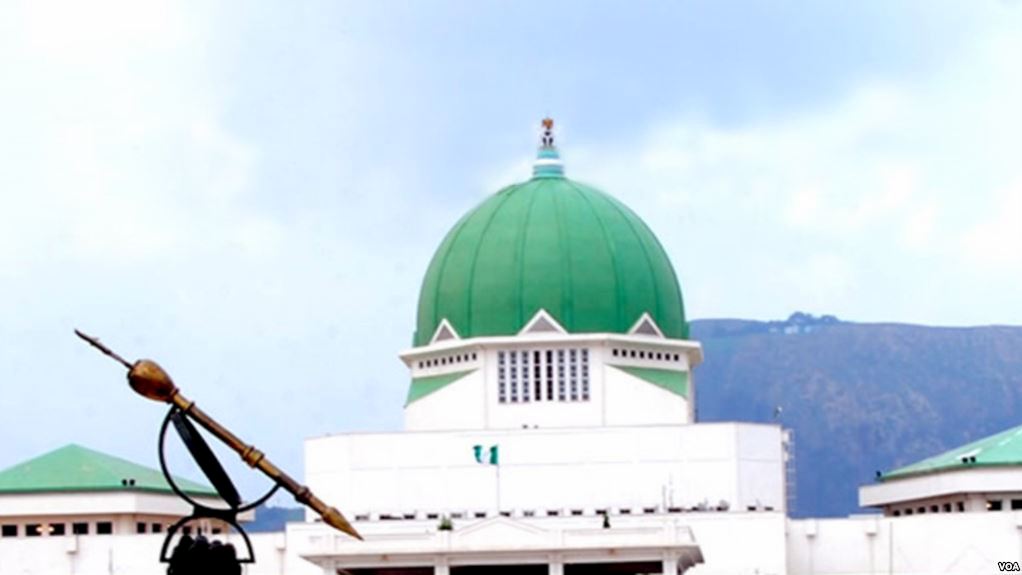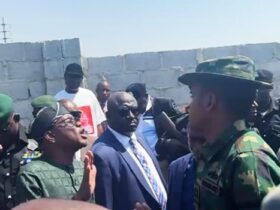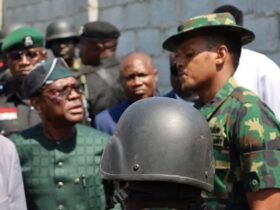A Controversial Decision
President Bola Tinubu’s declaration of a state of emergency in Rivers State has sparked widespread debate and criticism. However, the House of Representatives has come forward to clarify that the President consulted the National Assembly before making the announcement. According to Akin Rotimi, the spokesperson for the House, Tinubu met with the leadership of the National Assembly and key security officials to discuss the decision, which was unanimously supported. This revelation aims to address concerns about the constitutionality of the move and provide clarity on the process behind the declaration.

The Meeting: A Collaborative Decision
In a statement released on March 19, 2025, Akin Rotimi revealed that President Tinubu held a high-level meeting with the leadership of the National Assembly and top security officials before declaring a state of emergency in Rivers State. The meeting included Senate President Godswill Akpabio, Speaker of the House Abbas Tajudeen, Deputy Speaker Benjamin Kalu, Senate Leader Michael Bamidele, House Leader Julius Ihonvbere, and National Security Adviser Nuhu Ribadu.
Also in attendance were Inspector-General of Police Kayode Egbetokun, Director-General of the State Security Service Adeola Ajayi, and Director-General of the National Intelligence Agency Mohammed Mohammed. Rotimi stated that during the meeting, Tinubu briefed the attendees on his intentions, and all present expressed their unanimous support for the decision.
“During this meeting, they were fully briefed on Mr. President’s intentions, and all present unanimously expressed their support,” Rotimi said. This collaborative approach, according to the House spokesperson, demonstrates that the decision was not made unilaterally but was the result of extensive consultations with key stakeholders.
The Legal Basis: Section 305 of the Constitution
Rotimi emphasized that President Tinubu’s actions were in line with Section 305 of the 1999 Constitution, which outlines the procedure for declaring a state of emergency. According to the constitution, the President must transmit a letter to the National Assembly informing them of the decision and seeking approval. Rotimi confirmed that Tinubu’s letter had been transmitted to the House of Representatives and would be read during plenary on Wednesday for further legislative action.
This clarification comes amid criticism from opposition parties and civil society groups, who have accused Tinubu of overstepping his constitutional authority. The House spokesperson’s statement aims to address these concerns by highlighting the collaborative nature of the decision-making process and the adherence to constitutional provisions.
The Context: Rivers State’s Political Crisis
The declaration of a state of emergency follows months of political turmoil in Rivers State. The crisis, which began as a power struggle between Governor Siminalayi Fubara and his predecessor, Nyesom Wike, has escalated into widespread unrest, threatening the stability of the oil-rich state. The conflict has led to protests, violence, and a breakdown of governance, prompting calls for federal intervention.
Tinubu’s decision to suspend Fubara, his deputy, and the members of the state assembly has further intensified the controversy. In place of the suspended officials, Tinubu nominated retired Vice-Admiral Ibok-Ete Ibas as the administrator of Rivers State. This move has been met with mixed reactions, with some praising it as a necessary step to restore order and others condemning it as an overreach of executive power.
Opposition Reactions: A Divided Nation
The Peoples Democratic Party (PDP) and other opposition groups have rejected Tinubu’s declaration, calling it unconstitutional and an attack on democracy. The PDP has accused the President of attempting to undermine the will of the people and impose an undemocratic rule in Rivers State. In a statement, the party described the move as a “climax of a well-oiled plot to forcefully take over Rivers State.”
Prominent figures like former Minister Femi Fani-Kayode have weighed in on the issue, offering their perspectives on why Tinubu took such a drastic step. Fani-Kayode described the move as a necessary intervention to prevent further destabilization of the region. “The situation in Rivers State had reached a point where federal intervention was unavoidable,” he said. “The President’s decision, though difficult, was in the best interest of the nation.”
Meanwhile, supporters of the All Progressives Congress (APC) have defended the decision, arguing that it is necessary to address the escalating crisis and restore peace. They point to the breakdown of law and order in Rivers State as justification for the declaration.
The Bigger Picture: Implications for Nigeria
The declaration of a state of emergency in Rivers State has far-reaching implications for Nigeria’s political landscape. It raises critical questions about the balance of power between the federal and state governments, the role of the National Assembly in such decisions, and the future of democracy in the country.
For Rivers State, the immediate focus is on restoring stability and addressing the root causes of the crisis. The appointment of Vice-Admiral Ibas as administrator signals a shift toward a more centralized approach to governance, but it remains to be seen whether this will lead to lasting peace or further exacerbate tensions.
The situation also highlights the challenges of managing political conflicts in a diverse and complex nation like Nigeria. The federal government’s intervention in Rivers State could set a precedent for how similar crises are handled in the future, making it a critical moment in the country’s political history.
The Role of the National Assembly: A Check on Executive Power
The involvement of the National Assembly in the decision-making process underscores the importance of checks and balances in a democratic system. By consulting with legislative leaders and seeking their approval, Tinubu has demonstrated a commitment to upholding constitutional principles and ensuring that such significant decisions are made transparently and accountably.
However, the opposition’s rejection of the declaration highlights the need for greater inclusivity and dialogue in addressing political crises. The National Assembly’s role in reviewing and approving the state of emergency will be crucial in determining the legitimacy and effectiveness of the intervention.
A Nation at a Crossroads
As Nigeria grapples with the fallout from Tinubu’s declaration, the situation in Rivers State serves as a microcosm of the broader challenges facing the country. The need for dialogue, transparency, and adherence to constitutional principles has never been more urgent. Whether this decision will pave the way for reconciliation or deepen the divide remains to be seen.
Read also: “Rivers Crisis: APC Chieftain Ayekooto Advises Fubara on How to End Political Feud”
For now, the House of Representatives’ clarification offers some insight into the decision-making process, but it also underscores the need for greater accountability and inclusivity in addressing Nigeria’s political crises. The coming days will be critical as the National Assembly debates the declaration and the people of Rivers State await a resolution to the crisis.
















Got a Questions?
Find us on Socials or Contact us and we’ll get back to you as soon as possible.